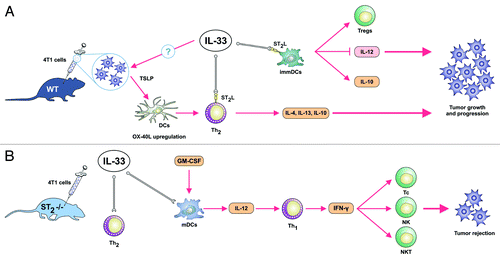Figures & data
Figure 1. Hypothetical role of IL-33/ST2 axis in tumor growth and progression based on mouse mammary adenocarcinoma 4T1 cancer model. (A) The effects of endogenous and also exogenous IL-33 in tumor-bearing hosts. IL-33 via its receptor ST2L activates Th2-polarized cells and generates relatively immature dendritic cells that do not produce IL-12p70. Subsequently, ST2 signaling could possibly enhance production of thymic stromal lymphopoietin (TSLP) by tumor cells which by upregulating OX40L on dendritic cells lead to induction of IL-4, and more importantly immunosuppressive IL-10 and IL-13 producing Th2-cells that promote cancer escape. Immature dendritic cells induce T regs that contribute to an immunosuppressive environment and facilitate metastasis. (B) In the absence of ST2 (IL-33 receptor), IL-33 produced by epithelial cells and possibly tumor cells does not lead to the activation of Th2-associated immunosuppressive response. Concomitantly, IL-12 produced by classically activated M1 macrophages lead to the maturation of DC, strong IFN-γ production by Th1 cells which activate tumoricidal NK, NKT cells and CD8+ T cytotoxic lymphocytes.
